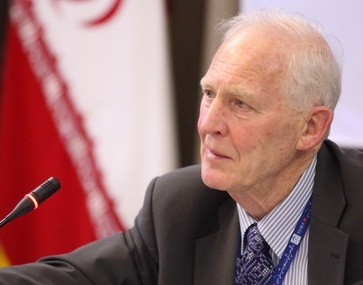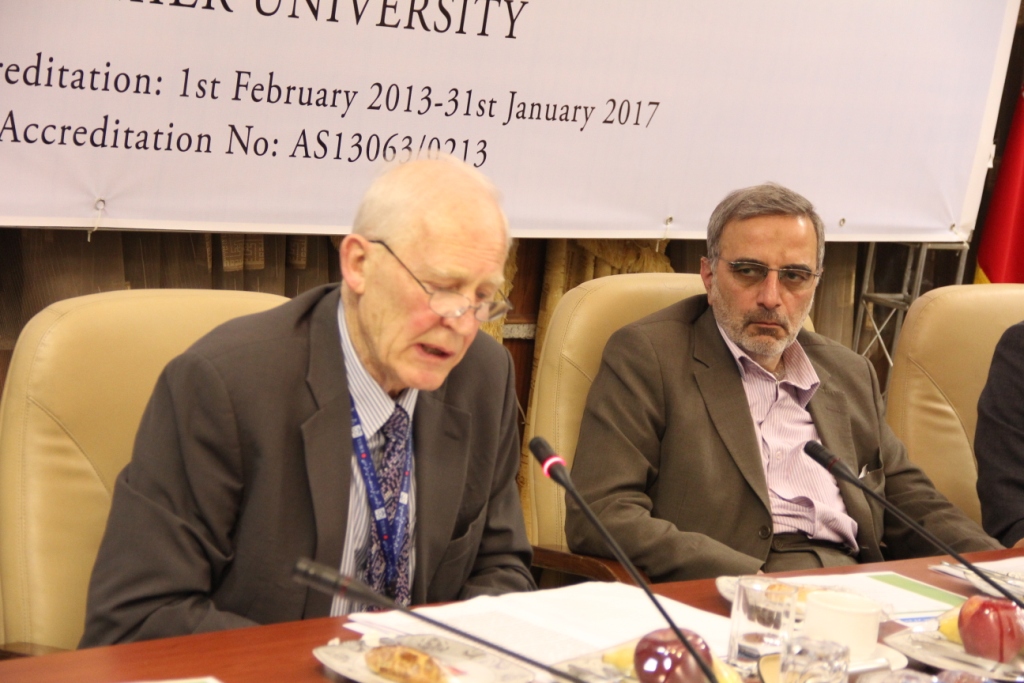Teachers' Day Speech, Prof. Dr John Wilson at TUMS

Chancellor Dr. Mohammad Reza Mansouri, Ladies and Gentlemen:
I am indeed very happy to be with you today, on the Teachers' Day in Iran. I understand that Teachers' Day celebrations are held all over the country to honour all teachers, and to express your nation's gratitude to them for their dedicated service to the nation. Teachers' Day is the ideal way of telling teachers that we are thankful for their presence in our society.
Before I continue with my address I would like to make some introductory comments.
Firstly, I would like to thank Professor Dr Bagher Larijani for his time as Chancellor of the Tehran University of Medical Sciences and for his careful direction of the University and the initiatives he has introduced, in particular for his initiative in undertaking accreditation by an external body, that id the Accreditation Service for International Colleges and Universities (ASIC).
Secondly, I would like to congratulate Dr Mohammad Reza Mansuri on his appointment as the new Chancellor and wish him every success in overseeing the continuing development of such a prestigious university.
Thirdly, I would like to convey the apologies and regrets of Mr Maurice Dimmock, our Accrediting Body`s Chief Executive, that due to family illness he is unable to be with you today.
His loss, however, is my gain as it has enabled me to return to TUMS following my visit last November much sooner than I expected, and given me the opportunity to meet again and enjoy the company of so many of those I met on that visit.
Finally, as a mere physicist, to say that I feel somewhat daunted to be invited to speak to an audience comprising so many eminent and well qualified medical personnel. However, I stopped to think about the contributions that physics has made to medicine ranging from basic X-rays to CT scans and MRI imaging, the electron microscope, cancer treatment using radioactive sources and linear accelerators, and the many uses of lasers such as basic surgery and laser Doppler measurements. A particular application of this technique, which had its origins, in part, in my former Faculty of Engineering, Science and Technology, is the measurement of skin blood flow which is used in the assessment of burns. (This research led to a commercial instrument which has sold world-wide generating a very substantial income.)
When a recent Prime Minister of the UK was asked what the three most important issues were for the success of his term in office, he replied:
‘Education, education, education’.
Education is the key to everything. It is the key to peace and democratic stability, to jobs and economic growth, to good health, to respect and harmony between different genders, faiths, ethnic groups and communities. It is the key to billions of unique human beings fulfilling their unique potential.
And teachers are the key to education. You can have a school, college or university without a building, without books and pens and desks and blackboards, and I suppose computers;
But you can’t have a school, college or University without teachers. It’s as simple as that. Everyone in this room will have unforgettable experiences of being shaped and influenced by wonderful teachers.
So on Teachers’ Day in Iran I warmly salute your teachers.
We are all deeply in their debt – so are your children – so too will be your grandchildren.
Nearly 50 years ago the ILO/UNESCO Intergovernmental Conference (5 October 1966) announced its Recommendations on the Status of Teachers, which was followed on 11 November 1997 by similar Recommendations on the status of Higher Education and University Teachers, but in fact we knew their status 2400 years ago. Alexander the Great wrote that he was ‘indebted to his father for living, but to his teacher for living well’.
Teaching has always been considered a noble profession. Through teachers flow the values and culture of a nation and its people. Teachers' own value system, their character and their behaviour directly influence our young people. But, misinformation and limited learning behaviours, that young people sometimes internalise or assimilate, can also be traced back to teachers' lack of knowledge, poor understanding, or biases. We must guard against these negative features.
Teachers are invariably seen as front-line participants in educational reform, which is critical to successful, high quality schools and universities. Sadly, however, teachers are often excluded from the policy-making, governance and management of our educational systems, and also from the day-to-day development of instructional strategies and decision making. In our endeavours to bring about improvements through educational reforms we must, therefore, emphasize the empowerment of teachers, which includes real opportunities for them to share policy perspectives and decision-making in pursuit of educational development and enhancement.
It is my belief that teachers are creative, talented people; teachers respond very positively when they are respected and included in the decision-making integral to their work in the classroom or lecture theatre. They gain a sense of ownership over their work when they are involved in the development of the curriculum, designing detailed syllabuses and assessment schemes, making and selecting the teaching materials, and involved in training programmes leading to their own intellectual and professional development.
One critical area that all teachers must reflect upon is the equality and inclusiveness of any educational system. Numerous programmes have been initiated that focus on equality and inclusiveness, paying particular attention to the minority communities, or children and students with special medical or learning needs or other problems. Such programmes will result in an empowered youth and citizenship, only if their teachers are empowered supporters of equality and inclusiveness. If efforts to increase student access, learning and retention in elementary, secondary and tertiary education are to succeed and make headway, relevant and empowering teacher education is of critical importance.
The time has come for all of us to ensure that every child has the opportunity to exercise his or her right to an education of equitable quality. In many parts of the world this is not the case, and we should all be critical of regimes where for example, young women are denied the opportunity to gain an education and contribute to society as a whole. I was impressed, however, during my previous visit to TUMS by the very high number of female students.
Today, you have both the challenge and opportunity to provide good quality education to all your young people, but we need to ask whether we can do more for all students.
Through you, your country can aspire to build in your young people a commitment to the values of equality, justice, freedom, and respect for human dignity. I urge you to develop in your young people independence of thought, action and the capacity of carefully considered decision making, which is based on reason and understanding.
Through you, your young people must develop sensitivity to others' well-being and feelings. Through you, your young people must develop the ability to work and participate in economic and social processes and in processes of social change.
These aspirations for your young people necessarily mean that their educational environment should be free from fear, trauma and anxiety. No young person, irrespective of religion, gender or the community to which he or she belongs should dread the thought of going to school, college or University.
The educational systems in many countries are at a very critical juncture. As they develop they will have to maintain the fine balance between tradition and continuity on the one hand, and modernity and innovation and change on the other. This is not always an easy balance to achieve given that our history grows daily, and given the ever increasing rate of development particularly in areas such as medicine, engineering and science. As teachers, you are amongst the most important nation builders, you constitute your nation's most precious national resource, and the country looks to you to guide your young people in their quest for knowledge, truth and in their capacity to lead a life of dignity and self respect.
Teachers play a prominent role in the life of their students. They act as the guide for life, show the path towards success and enrich the personality of their students by imparting ethical and academic knowledge. They bring out the talents of their students and sharpen them in order to achieve the best results.
In recognising the critically important role of teachers it is appropriate to recognise and warmly welcome the support they receive from many others in the schools and universities. Without the valuable contributions of the technical, library and administrative support staff, the caretakers, and maintenance and grounds staff, schools and universities would not function.
In conclusion I would like to read you a few pertinent quotes on teaching:
"The mediocre teacher tells. The good teacher explains. The superior teacher demonstrates. The great teacher inspires."
"A teacher's purpose is not to create students in his own image, but to develop students who can create their own image."
"What the teacher is, is more important than what he teaches."
"The dream begins with a teacher who believes in you, who tugs and pushes and leads you to the next plateau, sometimes poking you with a sharp stick called truth."
"Teaching is the profession that teaches all the other professions."
When Dr Lawrence Watson and I visited the Tehran University of Medical Science to undertake its accreditation we were extremely impressed by the commitment and quality of the lecturers. They demonstrated not only outstanding subject knowledge, but also skills in teaching and above all a sincere commitment to the students in their care.
This was one of the many reasons we were able to award TUMS a Premier Status within our accreditation system.
With these words, I congratulate each one of you. On the occasion of the Teachers Day I extend my heartfelt warm greetings to all members of the teaching community, and support staff, and wish each one of you success and fulfilment in your personal life and vocation.
Finally, I would like to present the ASIC Accreditation Certificate to the Chancellor, Dr Mansouri.


Your Comment :